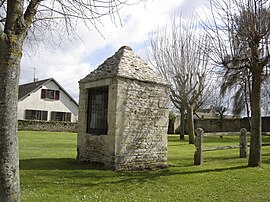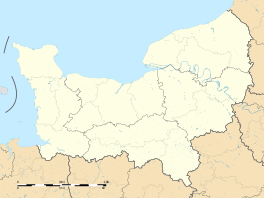Banville, Calvados
| Banville | ||
|---|---|---|
| Commune | ||

A covered well in Banville
|
||
|
||
| Coordinates: 49°18′48″N 0°29′13″W / 49.3133°N 0.4869°WCoordinates: 49°18′48″N 0°29′13″W / 49.3133°N 0.4869°W | ||
| Country | France | |
| Region | Normandy | |
| Department | Calvados | |
| Arrondissement | Bayeux | |
| Canton | Courseulles-sur-Mer | |
| Intercommunality | Bessin, Seulles et Mer | |
| Government | ||
| • Mayor (2008–2020) | Chrystèle Pouchain | |
| Area1 | 4.68 km2 (1.81 sq mi) | |
| Population (2010)2 | 657 | |
| • Density | 140/km2 (360/sq mi) | |
| Time zone | CET (UTC+1) | |
| • Summer (DST) | CEST (UTC+2) | |
| INSEE/Postal code | 14038 /14480 | |
| Elevation | 2–53 m (6.6–173.9 ft) (avg. 25 m or 82 ft) |
|
|
1 French Land Register data, which excludes lakes, ponds, glaciers > 1 km² (0.386 sq mi or 247 acres) and river estuaries. 2Population without double counting: residents of multiple communes (e.g., students and military personnel) only counted once. |
||
1 French Land Register data, which excludes lakes, ponds, glaciers > 1 km² (0.386 sq mi or 247 acres) and river estuaries.
Banville is a commune in the Calvados department in the Normandy region of north-western France.
The inhabitants of the commune are known as Banvillais or Banvillaises.
Banville is located in the Bessin area some 3 km south-west of Courseulles-sur-Mer and 5 km east of Crépon. Access to the commune is by the D12 road from Graye-sur-Mer in the north which passes through the village and continues south-west to Tierceville. The D112A goes west from the village to Sainte-Croix-sur-Mer. The commune is mostly farmland but with a significant sized residential area.
The Seulles river forms the entire eastern border of the commune as it flows north to the English Channel at Courseulles-sur-Mer.
During the invasion of Normandy Banville was located within 3 kilometres of Juno Beach (Mike sector), the landing zone for Canadian troops. The village was liberated on the 6 June 1944 by the Royal Winnipeg Rifles.
Vair.
List of Successive Mayors
(Not all data is known)
In 2010 the commune had 657 inhabitants. The evolution of the number of inhabitants is known from the population censuses conducted in the commune since 1793. From the 21st century, a census of communes with fewer than 10,000 inhabitants is held every five years, unlike larger communes that have a sample survey every year.
Sources : Ldh/EHESS/Cassini until 1962, INSEE database from 1968 (population without double counting and municipal population from 2006)
...
Wikipedia



